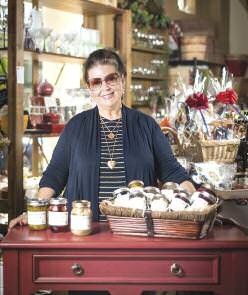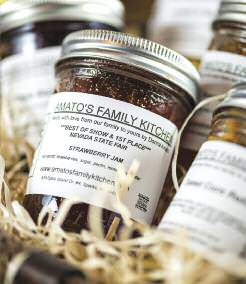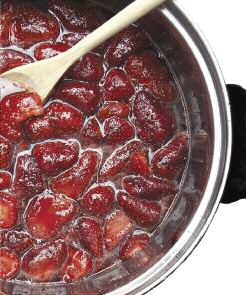edible endeavors
HOUSE MADE GOODS
New laws open up possibilities for micro-food businesses.
WRITTEN BY JEANNE LAUF WALPOLE
When Jessie Phillips, a self-described foodie, baker, and caterer, relocated to Truckee from the Bay Area, she was eager to get involved in the area’s food scene.
“I moved to Truckee as a reprieve from city life. I was missing the connection to the food community,” she says.
As she looked for opportunities to get into the food business, Phillips became an outspoken proponent of California’s Cottage Food Operations law, which went into effect Jan. 1, 2013.
“It was really inspiring to me that I could start a small-scale home business,” she says.
Homemade Foods
According to the law, a cottage food operation is an enterprise at a private home where low-risk food products are prepared or packaged for public consumption. Only non-potentially hazardous foods that do not require refrigeration are allowed, such as candy, dried fruit, jams and jellies, vinegar, mustard, roasted coffee, dried teas, and baked goods without cream, custard, or meat fillings.
Phillips says her ultimate plan is to sell such items as pastries, baking mixes, crackers, and granola made from seasonal organic ingredients.
“I see a need for more locally based food producers,” she says.

Before the passage of the law, all foods for sale to the public had to be produced in a commercial kitchen, which required small businesses to either rent kitchen space or build them for their own uses. In most cases, this proved cost prohibitive. The CFO law permits production in home kitchens when a self-certification checklist verifying basic sanitation has been submitted.
The California law also limits the size of gross sales to $50,000 or less by 2015, provides for direct and indirect sales through several classes of certification, and identifies labeling requirements. Additional details are a work in progress as county health agencies hammer out the specifics of implementation.
Silver State Law
Similar to California’s law, aspects of SB-206, the Nevada Cottage Food Industries law, passed at this year’s legislative session and aspects of it went into effect on July 1. Small business owners and food producers across The Silver State are excited by the entrepreneurial opportunities now available. For one, Jack Jacobs, owner of Jacobs Family Berry Farm in Gardnerville, says the Nevada law eliminates the expense of a commercial kitchen and costly permitting fees, thus allowing him to make a profit on producing jams.

“Personally, I wouldn’t be able to sell jam without this,” he says.
According to Bob Sack, director of environmental health for the Washoe County District Health Department, the Nevada law doesn’t require quite as much oversight as the California law does. But he expresses concern about people knowing exactly which foods are allowed and which aren’t.
“One of the main things we’re running into is problems with the list of what’s acceptable,” he says.
For example, Sack says his office has received a number of inquiries regarding pickling, which isn’t allowed. Details of the law, which will be fully implemented by the end of the year, are spelled out on the county’s website. Sack encourages people to make personal contact with representatives at the health department to be sure they understand the ins and outs of the law before preparing and selling foods. But he adds that the permitting process only takes a few weeks, so people can and should apply right away.
In addition to encouraging production and sales of locally produced food products, the new laws associated with cottage foods help showcase the economic diversity of agricultural regions in both states.
“We’re helping the agricultural future in our communities,” Jacobs says.
Jeanne Lauf Walpole is a Reno-based freelance writer and former business owner who applauds the recently enacted cottage foods laws that will help individual entrepreneurs to offer a plethora of new food choices.
University of Nevada Cooperative Extension is a resource for the new cottage food laws. For details, contact Becky Holys at 702-397-2604, ext. 0; Holysr@unce.unr.edu; or visit Www.unce.unr.edu.
To follow the latest developments as these laws roll out, consult:
www.Cottagefoods.org/laws/usa (add state name in search box)
Washoe County District Health Department, Nev. www.Washoecounty.us/health or call 775-328-2434
www.Gethealthycarsoncity.org/environmental-health/cottage-food/
Plumas County, Calif. Countyofplumas.com or www.Cottagefoods.org


